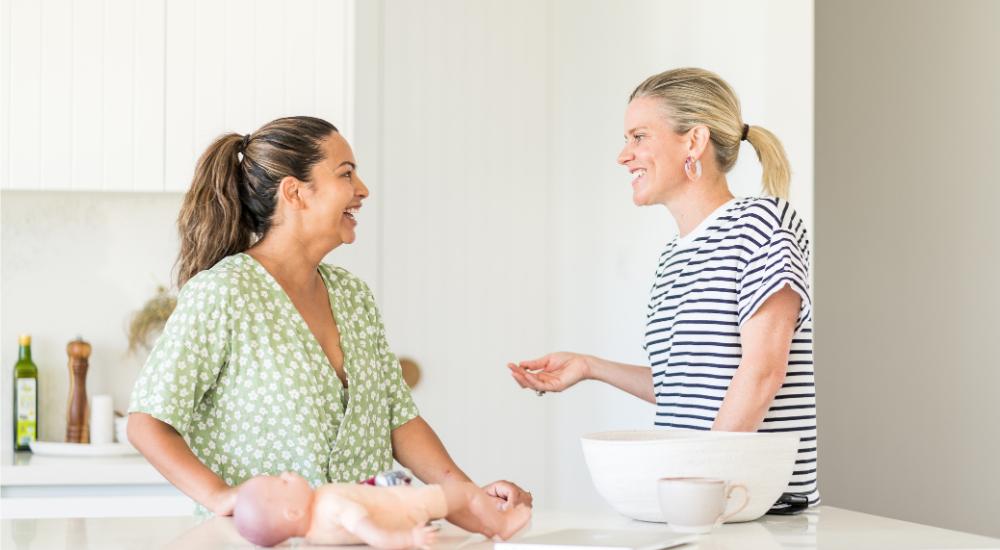What do you know about your fertility?
8 tips to maximise fertility
What comes to mind when you think about your fertility? Do you know what health and lifestyle factors can influence yours and how to increase your chances of falling pregnant?
Fertility isn’t important for most women until it’s really important – as in, never gave it a second thought until you were browsing home pregnancy test kits at Woolies (after spending most of your twenties making sure that you didn’t fall pregnant!)
While most women I speak to through Birth Beat are Mummas-to-be or Mums, I get lots of messages from women who are trying to fall pregnant. Everyone’s journey to parenthood starts at a different point and for many, it begins with loads of research, reading and endless scrolling trying to learn the A-Z of fertility, ovulation and how to get that dream-come-true positive pregnancy test.
You’ve no doubt heard the stories about celebrities having babies well into their 50s and beyond. As wonderful as it is for them, the truth is that for most of us, it’s the kind of story that will stay in Hollywood.
While advancements in technology are enabling women to have babies much later in life than nature usually intends, the reality is: there is a time-limit on your childbearing years. There are also lifestyle and health factors that can have an impact on fertility, which I will break down in point form below.
And don’t forget, fertility isn’t just something for you to consider…despite the misconception that fertility health is women’s business, it really does take two to make a baby! That means if you’re thinking about trying to make a baby anytime soon, your partner’s health and lifestyle play just as an important role as your’s. * Please share this with your partner!
This post isn’t designed to worry you – just to get you thinking and as a guide if you’re at the beginning of your journey to pregnancy.
This is what you should be aware of and up to speed on right now: what factors influence fertility, what is within your control and how you can maximise your chances of falling pregnant when you want to.
Some of the most common questions that I’m asked around fertility include:
When should I seek help if I haven’t been able to fall pregnant?
What are some common female fertility issues? What about guys?
What are my treatment options?
How do I increase my chances of falling pregnant each month?
If you’ve had any of these thoughts, you’re not alone!
1. Seek professional help if you’re concerned
If you’ve been trying to fall pregnant for more then 12 months without success and you’re under 35, now is the time to chat to your GP for your next steps.
If you’re over 35, and you’ve been trying for 6 months without success it’s a good idea to speak with your GP as soon as you can.
Depending on your individual situation, your GP may run some tests or refer you to a fertility specialist to start exploring your next options.
If you’d like to read more about alternative pathways to pregnancy, check out our post Birth Beat’s Guide to Alternative Pathways to Pregnancy and Parenthood.
2. Age does matter
For most women, fertility gradually tails off from around the age of 32 and starts to decline more rapidly from 35. That doesn’t mean to say that you won’t fall pregnant after 35, but slowly, your chances of conceiving each month will start to decrease.
As always, every woman is different and there will always be exceptions. But for your best chances of falling pregnant, you’re statistically more likely to do so within 6-12 months of trying if you’re under the age of 35.
There are just SO many variables that influence when a woman can have a baby and when she is ready to. Remember, these ages are just numbers to keep in mind not ones to get fixated on and stress over. Easy said than done, I know but it’s always best to be armed with the facts.
Age is one factor involved in fertility and an important one, but there are many others.
3. A healthy weight gets things off to a healthy start
There is a tonne of evidence to demonstrate that having a healthy BMI and being generally fit and well will have a positive impact on your fertility.
If you’re thinking about trying for a baby soon, now is the time to make those healthy lifestyle changes. Eating a well balanced diet that’s loaded with fresh veggies and fruit, avoiding highly processed, sugary and fatty foods, drinking plenty of fresh H2o and making exercise a regular habit, will all go a long way to improving your overall general health which will have a positive effect on your fertility.
4. Increase sleep and minimise stress
To make a baby you need to be ovulating regularly and to ovulate, your hormones need to be singing in tune!
Lack of sleep and chronic stress (constantly rushing around, never truly switching off, running yourself into the ground) can result in several hormonal imbalances which can affect fertility. Not to mention, who feels like making a baby when you’re tired, burnt out and stressed. Not so sexy huh?!
Dr. Libby Weaver has an incredible book called Rushing Women’s Syndrome, which explains in more depth how our modern lifestyles are impacting our health and fertility. It also shares her wisdom on how you can get things back on track for a healthier body and happier hormones. Check it out here.
5. Smoking can affect both male and female fertility
This is a no brainer, but it needs to be said. Smoking is linked to all kinds of health issues, fertility included.
Babies conceived to parents who smoke are at a higher risk for a host of health complications both at birth and later in life including low birth weight, birth defects, allergies and some childhood cancers.
If you’re a smoker or exposed to passive smoke, there is a high chance that you’ll take longer to conceive than the average woman your age.
When it comes to male fertility issues, smoking is the most damaging factor. Smoking not only decreases sperm production but it can also alter the DNA of the sperm. Not ideal!
The bottom line – I urge you to consider quitting for your overall health, but if you’re trying to conceive, the sooner you and/or your partner quit smoking, the better.
6. Give alcohol a miss
While many of us enjoy Friday night wine-time with the girls, me included, if you’re serious about getting your body in top form for conception, it’s best to cut right back on alcohol or do away with it completely.
This one is not just for you either, alcohol affects male fertility too so it’s a good idea to have a chat to your partner if they enjoy a drink or two regularly. Alcohol can lower testosterone levels and it can also affect sperm count, shape, size and mobility – not what you want when you’re trying to conceive a healthy bub. Sperm takes around 74 days to mature, so if you’re planning on trying for a baby, why don’t you both commit to going alcohol free for a good 3 months before you start trying.
7. Timing is everything
Despite what your high school Phys. Ed teacher had you believe, you can’t fall pregnant at any time during the month! Well, very very rarely anyway – you need to have ovulated in order to conceive.
Ovulation usually takes place mid-cycle, so let’s say around day 14 in your cycle is the average 28 days. This will vary for you, so it’s a good idea to read up on ovulation tracking or even try one of the many period tracker apps such as Flo
While sperm can survive for 2-3 days inside the vagina waiting for the egg, the egg itself will only last around 24 hours so it needs to be fertilised within this time.
That’s why it’s best to be having unprotected sex in the days leading up to ovulation, what’s often call the fertile window, if you’re trying to fall pregnant – the sperm can survive and wait around quite happily until the egg is released and then fertilisation can take place.
Takeaway – there are only 3-4 days each cycle whereby you can fall pregnant so if you’re trying for a baby, being aware of your cycle and when you’re ovulating is super important.
8. Sexual Health is vital
There are several sexually transmitted infections as well as health conditions of the reproductive system that can impact fertility.
Let untreated, STIs including chlamydia and gonorrhoea can lead to pelvic inflammatory disease and/or blocked fallopian tubes. These STIs are relatively straightforward to treat, but in many cases, people don’t even know they have them which is why its so important to get tested regularly if you have more than one sexual partner.
Other conditions such as PCOS (polycystic ovarian syndrome) and endometriosis can affect fertility as well. Having these conditions doesn’t rule out pregnancy all together – it may just take longer to fall pregnant and require medical support. Your healthcare professional can guide you on the best course of action for your individual circumstances.
I hope I’ve shared enough to get you thinking about your fertility, whether you’re wanting to conceive now or sometime in the future. What I want you to remember, and this is super important, is that no two women’s bodies or fertility experiences are the same. Please don’t take this as personal advice…I’ve written this blog for you purely as a starting point and to get you thinking about your fertility.
If you have any concerns or questions about your fertility or are wondering where to seek further advice, speak to your GP.
If you’re interested in learning more about fertility, here a few pages that might be useful for you.
Sometimes, it helps to read or hear someone else’s fertility story, whether to give your hope or make you feel a little less alone. The gorgeous Marica of Not So Mumsy, shares her infertility struggles on her blog – start here https://www.notsomumsy.com/blog/fertility-a-fresh-perspective for a real and raw insight into Marcia’s infertility journey.
If you’d like more in-depth or specific information, visit www.yourfertility.com.au to find a huge range of resources including fertility fact sheets, online tools and guidance on where to seek help.
Take care,
Ed x



